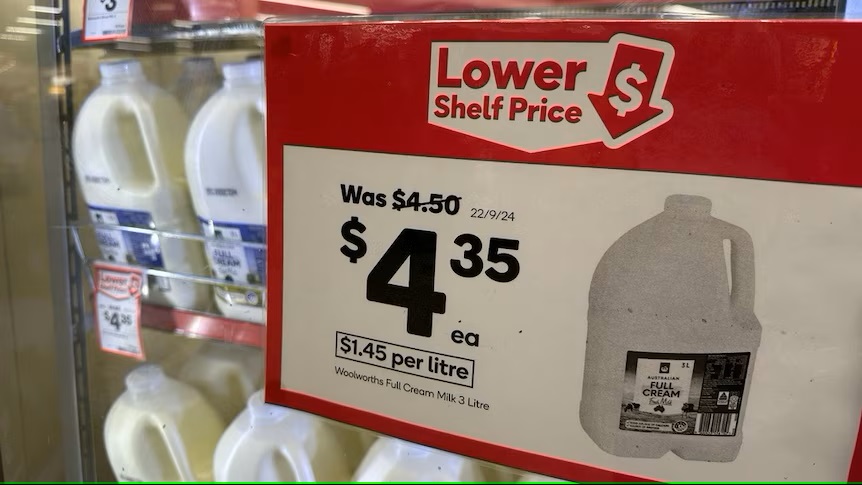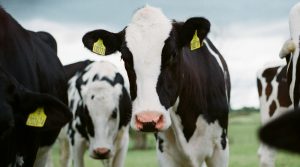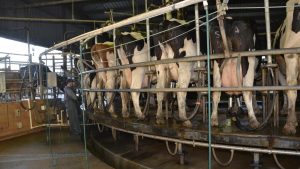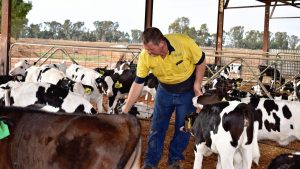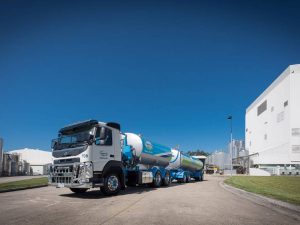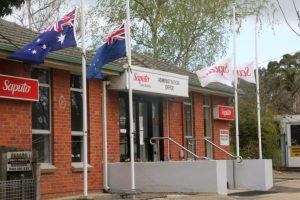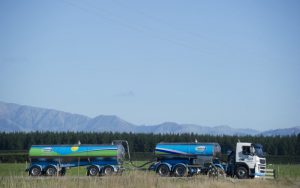
In short:
The cost of supermarket brand milk has gone backwards for the first time since 2011.
The move comes as Australia’s big-two supermarkets face scrutiny over discount pricing practices.
What’s next?
Dairy farmers say the price drop could signal a new milk price war between the retailers, and threaten producers’ livelihoods.
The cost of milk in major Australian supermarkets has gone backwards for the first time since 2011 amid growing scrutiny over discount pricing.
Coles and Woolworths reduced the price of its generic fresh milk last month by 5 cents, to $1.55 per litre.
Discount supermarket chain Aldi held firm at $1.60, before matching the price in October.
It’s the first time supermarket milk prices have gone backwards since January 2011, when Australia’s big three supermarkets slashed their prices to $1 a litre.
“We are very concerned where this is heading,” said Dairy Farmers Victoria president, Mark Billing.
The peak body for dairy farmers says retailers view milk as a “discount leader” — a cheap item that draws in customers. (ABC News: Justine Longmore)
Mr Billing runs a 400-head dairy farmer in Larpent, in south-west Victoria.
He said the supermarket’s approach devalues the product and could push farmers to the financial brink.
Coles said it had not changed the price it paid dairy farmers, while Woolworths said it is passing on savings from milk processors to customers.
Milk wars 2.0
Australian Dairy Farmers, the peak body for dairy farmers, told the ABC that retailers view milk as a “discount leader” — a cheap item that draws in customers.
While 1-litre milk dropped by 5 cents per litre, two-litre bottles have gone from $3.10 to $3.00, and 3-litre bottles from $4.50 to $4.35.
Mr Billing said the discount was significant.
“It’s extremely frustrating, particularly in the environment we’re in … margins are really, really tight, and it’s putting a lot of pressure on farm management,” he said.
Australian Dairy Farmers’ Mark Billing says the shelf price drop has farmers worried. (ABC Rural: Jane McNaughton)
The price reduction comes as Coles and Woolworths face legal action from the consumer watchdog over pricing practices.
The Australian Competition and Consumer Commission (ACCC) has alleged the companies misled consumers with discount pricing claims on hundreds of products, and has launched legal action against both companies.
Its latest report revealed customers don’t trust “sale price” claims at the grocers.
Mr Billing has questioned the timing of the price drop.
“We just need to understand what the strategy is,” he said.
“I’d love to be able to hear what their thinking is behind these reductions.”
Lower prices ‘passed on to customers’
Retailers are able to drop their prices as farmers are being paid less by the milk processors, according to the supermarkets.
“Changes in the farmgate milk price flow directly into the price we pay processors for their finished product — if the milk price goes up we pay more, and when it goes down we pay less,” a Woolworths spokesperson said.
“We’ve reduced the price of Woolworths branded milk to pass on the savings we’re receiving from our processors.”
Dairy farmers are facing smaller milk cheques and higher production costs. (ABC News: Nick Haggarty)
The current reduction is not an all-time low for the product, however.
In 2022, Woolworths sold its supermarket brand milk for $1.35 for one litre, before it increased the price to $1.60.
Coles said it bought direct from farmers for its own brand milk, and that it had not changed the price it was paying producers.
“We introduced a direct sourcing model for our own brand milk in 2019 to ensure we could provide fair, competitive and guaranteed farmgate prices to dairy farmers directly,” a Coles spokesperson said.
An Aldi spokesperson said the supermarket remained committed to fair pricing for suppliers.
“We remain focused on reviewing pricing for the whole dairy category on an ongoing basis,” the spokesperson said.
Long, hard road
The price drop comes as milk production in Australia is at its lowest in 30 years as dairy imports are increasing.
Pricing uncertainty since the outbreak of the $1-litre “milk wars” has left farmers exhausted, Mr Billing said.
“Farmers are a pretty resilient bunch, but a piece of wire is resilient too — you can only bend it so many times before it breaks,” he said.
“As it gets devalued, then it can be a little bit soul destroying when you’ve got a milk price drop.”
Around the turn of the century, there were 7,409 Victorian dairy businesses.
There are now 2,796.
Last year in Victoria, Australia’s biggest milk producing state, 8 per cent of its dairy farmers quit the business.
Editor’s Note 09/10/2024: A previous version of this story incorrectly stated that supermarket branded milk price was at its lowest since 2011. This has been rectified.
You can now read the most important #news on #eDairyNews #Whatsapp channels!!!
🇺🇸 eDairy News INGLÊS: https://whatsapp.com/channel/0029VaKsjzGDTkJyIN6hcP1K
